Mastering What Is Off Page and On Page SEO: 2025 Update


The world of SEO has transformed dramatically. In 2025, it's not just about keywords and links anymore; it’s about creating real value. A staggering 70 percent of search engine users never click past the first page. But here's the kicker: ranking high isn't solely about technical tricks. The real secret lies in building trust and authority through authentic content and user experience. Staying ahead means mastering both on-page and off-page strategies simultaneously. This could change how you view SEO forever.
Table of Contents
- Seo Fundamentals In 2025
- Mastering On-Page Seo Essentials
- Effective Off-Page Seo Techniques
- Comparing On-Page And Off-Page Seo
Quick Summary
| Takeaway | Explanation |
|---|---|
| E-E-A-T is Essential | Focus on Experience, Expertise, Authority, and Trust when creating content to improve its quality and relevance in search rankings. |
| Optimize for User Experience | Enhance Core Web Vitals and ensure fast loading times, mobile responsiveness, and logical site structure to satisfy both users and search engines. |
| Quality Over Quantity in Link Building | Prioritize high-quality, relevant backlinks from authoritative sites rather than accumulating numerous low-quality links for effective off-page SEO. |
| Integrate On-Page and Off-Page Strategies | To achieve optimal search visibility, ensure your on-page optimizations are complemented by external credibility-building efforts, creating a comprehensive SEO strategy. |
| Measure Success with Relevant Metrics | Track key metrics specific to on-page (e.g., keyword rankings, organic CTR) and off-page (e.g., backlink quality, domain authority) SEO performance for accurate assessment. |
SEO Fundamentals in 2025
The SEO landscape of 2025 represents a significant evolution from previous years, with search engines becoming increasingly sophisticated in understanding user intent and content quality. Mastering SEO now involves a deep understanding of its core principles, including technical, on-page, and off-page strategies that work together to improve website visibility on search engines like Google and Bing.
The Evolution of Search Algorithms
In 2025, search algorithms have become remarkably advanced at understanding context, semantics, and user behavior. The days of keyword stuffing and basic optimization tactics are long gone. Instead, search engines now evaluate content based on comprehensive factors that determine actual value to users.
According to Google's Developer Guidelines, the fundamental approach to SEO continues to revolve around creating high-quality, relevant content that provides genuine value to your audience. However, the definition of "quality" has expanded dramatically. Modern SEO requires content that demonstrates true subject matter expertise, addresses user needs completely, and delivers information in an engaging, accessible format.
The technical foundation of SEO remains crucial as well. For effective SEO, websites must be easily crawlable by search engines. This includes organizing site structures logically and implementing clean, consistent navigation that helps both users and search engines understand your content hierarchy.

E-E-A-T: The Quality Framework of 2025
Perhaps the most significant development in 2025's SEO fundamentals is the expanded emphasis on Experience, Expertise, Authority, and Trust (E-E-A-T). These factors have become central to how Google evaluates content quality and relevance.
Experience now refers to the demonstrated first-hand or life experience with a topic. Content created by someone who has actually used a product, lived in a location, or personally experienced a situation carries more weight than theoretical knowledge.
Expertise continues to be crucial - demonstrating specialized knowledge in your field through credentials, detailed explanations, and accurate information.
Authority extends beyond your own site to how others view your content. Backlinks, mentions, and citations from respected sources in your industry remain powerful signals of authority.
Trust encompasses everything from website security to transparency about who creates your content. In 2025, search engines are extraordinarily good at detecting misleading claims, factual inaccuracies, and content created primarily for search engines rather than users.
User Experience Metrics as Ranking Factors
The technical aspects of SEO have become increasingly intertwined with user experience. Core Web Vitals and other performance metrics directly impact rankings, as search engines prioritize sites that load quickly, respond immediately to user interactions, and maintain visual stability.
Mobile-first indexing has evolved into a "multi-device" approach, where content must perform flawlessly across an ever-expanding range of devices including smartphones, tablets, laptops, and even wearable technology. Responsive design has given way to adaptive experiences that customize content presentation based on the user's specific device capabilities.
AI-Driven Content Evaluation
Perhaps the most revolutionary change in 2025's SEO fundamentals is how AI systems evaluate content quality. Search engines now analyze content more like humans do, considering factors such as:
- Depth and comprehensiveness of topic coverage
- Logical structure and information hierarchy
- Uniqueness of insights and perspectives
- Practical value and actionability of information
- Engagement metrics that signal genuine user interest
This means that understanding what is off page and on page SEO has become more nuanced than ever. On-page factors now include not just keywords and meta tags, but also content structure, readability, multimedia integration, and internal linking strategies. Off-page signals have expanded beyond traditional backlinks to include brand mentions, social signals, and user reviews across the web.
The most successful SEO strategies in 2025 integrate both on-page optimization and off-page authority building into a cohesive approach that prioritizes genuine value for users above all else.
Mastering On-Page SEO Essentials
On-page SEO represents the foundation of any successful search engine optimization strategy. It involves optimizing specific elements directly on your webpage to help search engines understand your content and rank it appropriately. According to Paperstack, these elements include content, title tags, meta descriptions, headings, URLs, and internal links—all critical components that signal to search engines what your page is about.
Content Quality and Relevance
At the heart of on-page SEO lies your content. Search engines have become increasingly sophisticated at evaluating whether content truly answers user queries and provides value. Quality content is no longer just about keyword density—it's about comprehensive coverage of topics that satisfies user intent.
When creating content for SEO, focus on:
- Depth of information that covers all aspects of your topic
- Naturally incorporating primary and related keywords
- Creating easy-to-read, well-structured text with logical paragraph breaks
- Including unique insights or data that can't be found elsewhere
The Google SEO Starter Guide emphasizes that on-page improvements are among the most effective ways to enhance search performance. This includes writing compelling, fresh content that uses keywords naturally while providing genuine value to readers.
Technical On-Page Elements
Beyond content, several technical elements play crucial roles in on-page SEO success:
Title Tags: These HTML elements define the title of your webpage and appear as clickable headlines in search results. Effective title tags are 50-60 characters long, contain your primary keyword near the beginning, and accurately describe the page content. They represent your first opportunity to convince users to click through to your site from search results.
Meta Descriptions: While not direct ranking factors, these 150-160 character summaries influence click-through rates from search results. Craft meta descriptions that accurately summarize your content and include a call to action that entices users to click.
Header Tags (H1, H2, H3): These create a hierarchical structure for your content, making it easier for both users and search engines to understand your page's organization. Your H1 (which should appear only once per page) should contain your primary keyword and clearly indicate what the page covers. Subsequent headings (H2, H3) should follow a logical structure and incorporate secondary keywords where natural.
URL Structure: Clean, descriptive URLs help both users and search engines understand your content before even accessing it. Keep URLs relatively short, include your target keyword, use hyphens to separate words, and avoid unnecessary parameters or numbers.
User Experience Factors
As of 2025, on-page SEO encompasses more than just content and HTML elements. According to Mangools, effective on-page optimization requires mastering practical techniques that improve overall user experience:
Page Speed: Fast-loading pages are critical for both search rankings and user satisfaction. Optimize image sizes, leverage browser caching, minimize CSS and JavaScript, and consider using a content delivery network (CDN) to improve loading times.
Mobile Optimization: With mobile-first indexing now standard, your site must perform flawlessly on smartphones and tablets. Responsive design, properly sized tap targets, readable text without zooming, and avoiding software not common on mobile devices (like Flash) are essential considerations.
Internal Linking: Strategic internal links help search engines discover and understand the relationship between different pages on your site while helping users navigate to related content. Create a logical internal linking structure that prioritizes important pages and uses descriptive anchor text.
Structured Data Markup: Implementing schema markup helps search engines understand the context of your content, potentially leading to rich snippets in search results. These enhanced listings can dramatically improve click-through rates by providing users with more information directly in search results.
Content Optimization Best Practices
When optimizing existing content or creating new pages, follow these proven strategies:
- Place your primary keyword in critical locations: title tag, H1 heading, first paragraph, at least one H2 heading, and naturally throughout the content
- Use semantically related terms and phrases that support your main topic
- Optimize images with descriptive file names and alt text that includes relevant keywords
- Create content that provides genuine value and comprehensively answers questions users might have
- Update content regularly to ensure it remains accurate and relevant
On-page SEO continues to evolve, but its core purpose remains constant: creating the best possible content and user experience while making it easy for search engines to understand what your page offers. By mastering these on-page essentials, you establish the crucial foundation upon which all other SEO efforts build.
Effective Off-Page SEO Techniques
While on-page SEO focuses on optimizing elements within your website, off-page SEO encompasses all activities that happen outside your website to improve its search engine rankings. Off-page optimization sends powerful signals to search engines about your site's authority, trustworthiness, and relevance in your industry. According to Backlinko, link building remains the foundation of effective off-page SEO in 2025, with a focus on quality over quantity of backlinks from authoritative sites in your niche.
Strategic Link Building
Link building continues to be the cornerstone of off-page SEO, but the approach has evolved significantly. Today's effective link building strategies prioritize relevance and authority over sheer numbers. A single high-quality backlink from an authoritative website in your industry can provide more SEO value than dozens of low-quality links.
Successful link building tactics include:
Resource Link Building: Create comprehensive, data-driven resources that naturally attract links from other websites seeking to reference authoritative information. This might include original research, industry studies, or comprehensive guides that become go-to references in your field.
Broken Link Building: Identify broken links on high-authority websites in your niche, then reach out to webmasters with suggestions to replace those broken links with relevant content from your site. This provides value to both the website owner and their users while earning you quality backlinks.
Strategic Guest Blogging: According to Konker, guest blogging on high domain authority websites continues to be one of the most effective off-page SEO techniques for building quality backlinks and establishing industry authority. The key is targeting publications that reach your ideal audience and providing genuinely valuable content—not just thinly veiled promotional material.
Digital PR and Brand Building
Public relations has become increasingly important for off-page SEO success. Digital PR involves strategically placing your brand in publications, podcasts, and other media outlets to build awareness and earn high-quality mentions and backlinks.
Effective digital PR tactics include:
Data-Driven Story Pitching: Develop unique insights or research that journalists and content creators find compelling. Data journalism creates natural opportunities for backlinks as other publications reference your findings.
Expert Commentary: Position your team members as thought leaders by offering expert commentary on industry trends, breaking news, or emerging technologies. This can lead to quotes in articles, podcast appearances, and speaking engagements—all opportunities for brand mentions and backlinks.
HARO (Help A Reporter Out): Regularly responding to journalist queries through platforms like HARO can result in quotes in high-authority publications, typically accompanied by a backlink to your website.
Social Signals and Brand Mentions
While social media links are generally nofollow (meaning they don't directly pass link equity), social signals still impact SEO indirectly by:
- Increasing content visibility and potential for natural backlinks
- Building brand awareness that leads to direct traffic and branded searches
- Creating engagement that signals content quality to search engines
Focus on building genuine engagement rather than simply accumulating followers. Encourage sharing, commenting, and interacting with your content across platforms where your target audience is active.
Content Marketing and Syndication
According to Growth Machine, the most effective off-page SEO strategy for 2025 includes content marketing and syndication as key components. This involves creating exceptional content and strategically distributing it across multiple platforms to extend its reach.
Effective content syndication strategies include:
Strategic Partnerships: Form relationships with complementary businesses or publications to cross-promote content to each other's audiences.
Content Repurposing: Transform your existing content into different formats (videos, infographics, slideshows, podcasts) and distribute them on appropriate platforms, increasing your content's reach while building backlinks.
Industry Forums and Communities: Share your expertise in relevant online communities like Reddit, Quora, or industry-specific forums. Focus on providing genuine value rather than self-promotion, which can lead to natural link building as your contributions gain recognition.
Local SEO and Citations
For businesses with physical locations, local SEO represents a critical aspect of off-page optimization. This includes:
Google Business Profile Optimization: Maintaining an updated, complete business profile with accurate information, regular posts, and active review management.
Local Citations: Ensuring your business name, address, and phone number (NAP) appear consistently across online directories, review sites, and local business listings.
Review Management: Actively encouraging and responding to customer reviews across various platforms, which signals engagement and trustworthiness to both users and search engines.
Measuring Off-Page SEO Success
Effective off-page SEO requires consistent measurement and refinement. Key metrics to track include:
- Backlink profile growth (quantity, quality, and diversity)
- Referral traffic from backlinks
- Brand mention volume and sentiment
- Share of voice compared to competitors
- Domain authority improvements over time
By implementing these off-page SEO techniques strategically and consistently, you'll build the external signals that complement your on-page efforts, creating a comprehensive SEO approach that drives sustainable ranking improvements and organic traffic growth.
Comparing On-Page and Off-Page SEO
Understanding the relationship between on-page and off-page SEO is essential for developing a comprehensive search engine optimization strategy. While both aspects work toward the common goal of improving search visibility, they approach this objective from different angles and require distinct skill sets and resources. Let's explore how these two fundamental branches of SEO compare, contrast, and complement each other.
Control and Implementation Differences
Perhaps the most significant distinction between on-page and off-page SEO lies in the level of control you have over each aspect. On-page SEO elements fall entirely within your domain of control. You can directly modify your website content, adjust meta tags, improve page loading speed, or enhance mobile responsiveness whenever needed. This direct control makes on-page optimization the logical starting point for any SEO strategy.
Conversely, off-page SEO involves factors that largely exist beyond your direct control. While you can implement strategies to encourage backlinks or social sharing, you ultimately cannot force other websites to link to yours or guarantee social media engagement. This fundamental difference means off-page SEO typically requires more relationship building, outreach efforts, and patience to achieve results.
Timeline for Results
The timeframe in which you can expect to see results varies significantly between these two SEO approaches. On-page optimizations often yield quicker visible improvements. When you enhance page titles, improve content quality, or fix technical issues, search engines can detect and respond to these changes relatively quickly—sometimes within days or weeks.
Off-page SEO, in contrast, generally requires a longer-term perspective. Building a robust backlink profile or establishing brand authority across the web is a gradual process that unfolds over months or even years. According to SEO experts, the full impact of off-page optimization efforts may take 3-6 months to materialize in search rankings, particularly for competitive keywords.
Resource Requirements
The resources needed for effective implementation also differ between on-page and off-page strategies:
On-Page SEO Resources:
- Technical expertise for site optimization
- Content creation capabilities
- Access to website's back-end
- SEO analysis tools for keyword research and performance tracking
Off-Page SEO Resources:
- Relationship building and networking skills
- Outreach capabilities and communication tools
- Content worthy of earning mentions and links
- Social media management tools
- Brand monitoring systems
Complementary Strengths and Weaknesses
On-page and off-page SEO each address different ranking factors that search engines consider when determining search positions:
On-page SEO excels at demonstrating relevance to search engines by ensuring your content clearly communicates what topics your pages address. It helps search engines understand your content's purpose, structure, and value to users searching for specific information. As noted by SEO experts, on-page optimization focuses on enhancing the website's internal elements, such as content quality, title tags, and page speed, to improve both user experience and search engine rankings.
Off-page SEO, meanwhile, primarily builds authority and credibility signals that help search engines determine how trustworthy and important your site is within its topic area. External validation through backlinks, mentions, and social signals acts as a vote of confidence in your content. These authority signals are crucial for competitive rankings, as search engines view them as independent verification of your site's value.
Measurement and Analysis Differences
The metrics used to track success also differ between these SEO branches:
On-Page SEO Metrics:
- Keyword rankings for targeted terms
- Organic click-through rates
- Bounce rate and time on page
- Page loading speed
- Crawl statistics and indexing status
Off-Page SEO Metrics:
- Backlink quantity, quality, and diversity
- Domain authority scores
- Brand mentions across the web
- Social shares and engagement
- Referral traffic from external sources
Integrated Approach Is Essential

While we've highlighted the differences between on-page and off-page SEO, it's critical to understand that neither approach exists in isolation. A truly effective SEO strategy requires integration of both elements, as they reinforce each other in powerful ways.
For example, high-quality on-page content makes off-page link building more successful because people naturally link to valuable resources. Similarly, strong off-page signals can boost the performance of well-optimized pages by providing the authority needed to rank for competitive terms.
As SEO experts emphasize, to rank effectively in search engines, a well-rounded strategy combining both on-page website optimization and off-page external credibility building is necessary. Think of on-page SEO as building a strong foundation, while off-page SEO constructs the reputation that allows your site to stand out in a crowded digital landscape.
Ultimately, understanding what is off page and on page SEO as distinct yet interconnected approaches allows you to create a balanced strategy that addresses all aspects of search engine ranking factors—positioning your website for sustainable organic growth in an increasingly competitive online environment.
Frequently Asked Questions
What is the difference between on-page and off-page SEO?
On-page SEO refers to optimization techniques applied directly to your website, focusing on elements like content quality, HTML tags, and user experience. Off-page SEO, on the other hand, involves factors outside your website that contribute to its authority and credibility, such as backlinks, social signals, and brand mentions.
How does E-E-A-T affect SEO in 2025?
E-E-A-T stands for Experience, Expertise, Authority, and Trust. In 2025, it is essential for improving content quality and relevance in SEO. Search engines prioritize content that demonstrates real-world experience and expertise, is created by authoritative sources, and is trusted by users.
What are some effective on-page SEO techniques?
Effective on-page SEO techniques include optimizing content quality for user intent, utilizing relevant title tags and meta descriptions, enhancing page loading speed, ensuring mobile responsiveness, and implementing structured data markup to improve search engine readability.
Why is link building important for off-page SEO?
Link building is crucial for off-page SEO because it signals to search engines that other websites trust your content. High-quality backlinks from authoritative sites enhance your credibility and authority in your niche, positively influencing your search rankings.
Elevate Your SEO Game with BabyLoveGrowth.ai
In the ever-evolving landscape of SEO, mastering both on-page and off-page techniques is crucial for driving organic traffic and establishing authority. As highlighted in our recent article, achieving a high rank on search results isn't just about technicalities—it's about delivering genuine value and enhancing user experience. But let’s face it: with the increasing complexity of search algorithms, how can you keep up?
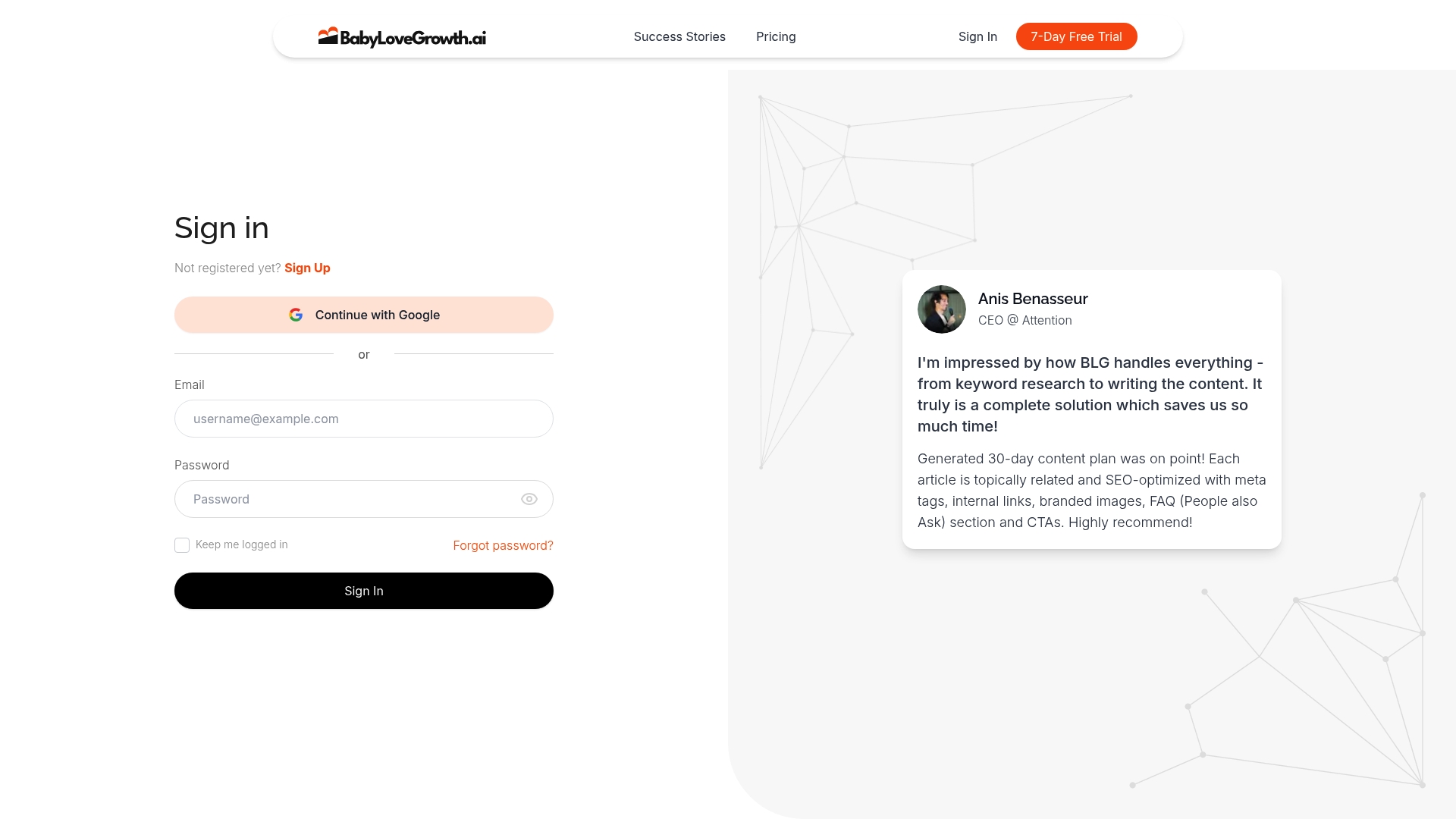
At BabyLoveGrowth.ai, we understand the challenges you face in today's SEO arena. Our AI-driven platform simplifies your journey through SEO by automating the creation of customized, high-quality content tailored to your specific business needs. Here’s how we can assist you:
- In-depth business analysis to pinpoint your unique challenges
- A custom 30-day content plan that harmonizes on-page and off-page strategies
- Automated generation of SEO-optimized articles to boost engagement and outrank competitors
Don't let the competition leave you behind. Start enhancing your digital presence NOW at BabyLoveGrowth.ai and watch as your website climbs the rankings effortlessly!
Recommended Articles
- What Is On Page SEO in Digital Marketing: Boost Rankings
- What is a Pillar Page? Understanding Pillar Content and Its Importance in SEO
- Understanding Nofollow Backlink: What You Need to Know for SEO Success
- What Is Google Page Ranking? A Simple SEO Strategy
- How Long Should an Article Be? Proven Strategies for Optimal Content Length
Smart SEO,
Faster Growth!
Most Read Articles
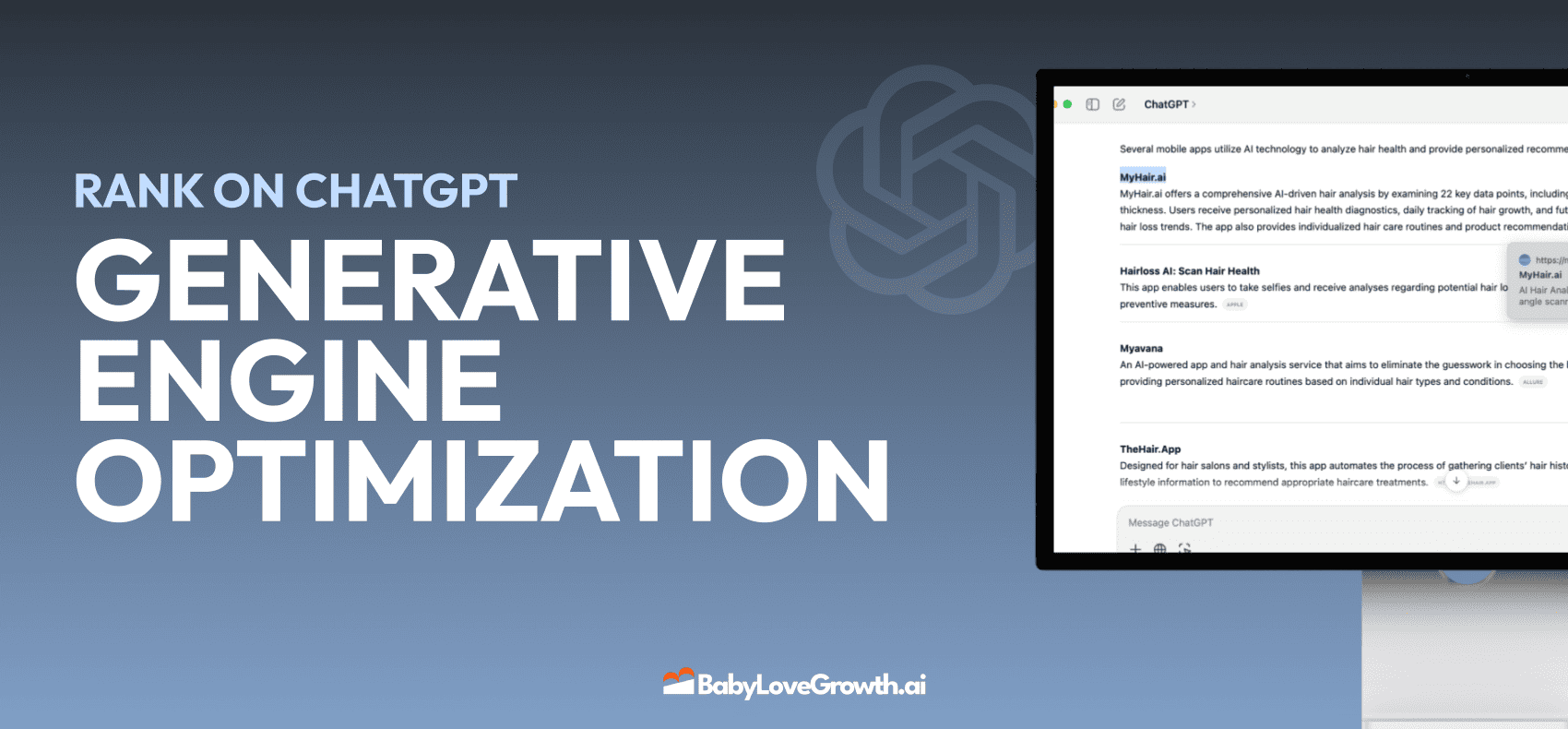
Generative Engine Optimization (GEO)
Learn how Generative Engine Optimization (GEO) helps your content rank in AI search engines like ChatGPT and Google AI. This comprehensive guide explains the differences between SEO and GEO, why it matters for your business, and practical steps to implement GEO strategies for better visibility in AI-generated responses.
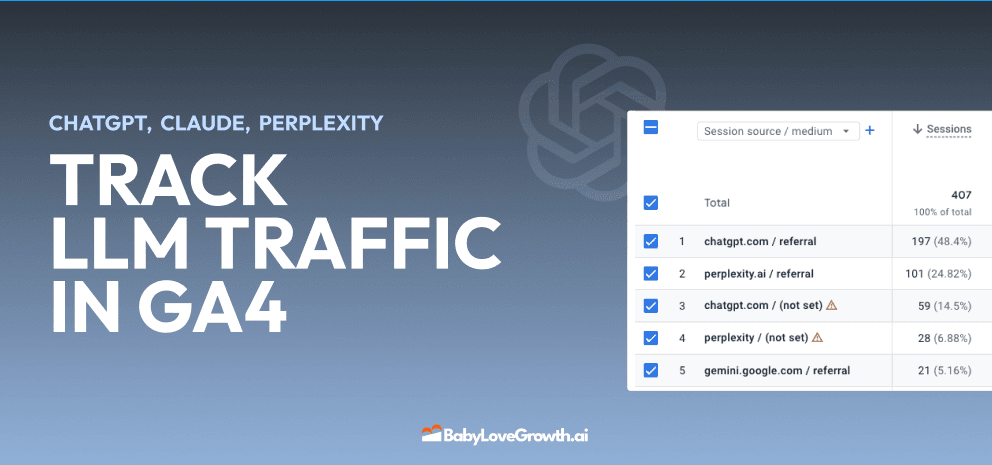
Track LLM Traffic in Google Analytics 4 (GA4)
Learn how to track and analyze traffic from AI sources like ChatGPT, Claude, Perplexity, and Google Gemini in Google Analytics 4. This step-by-step guide shows you how to set up custom filters to monitor AI-driven traffic and make data-driven decisions for your content strategy.
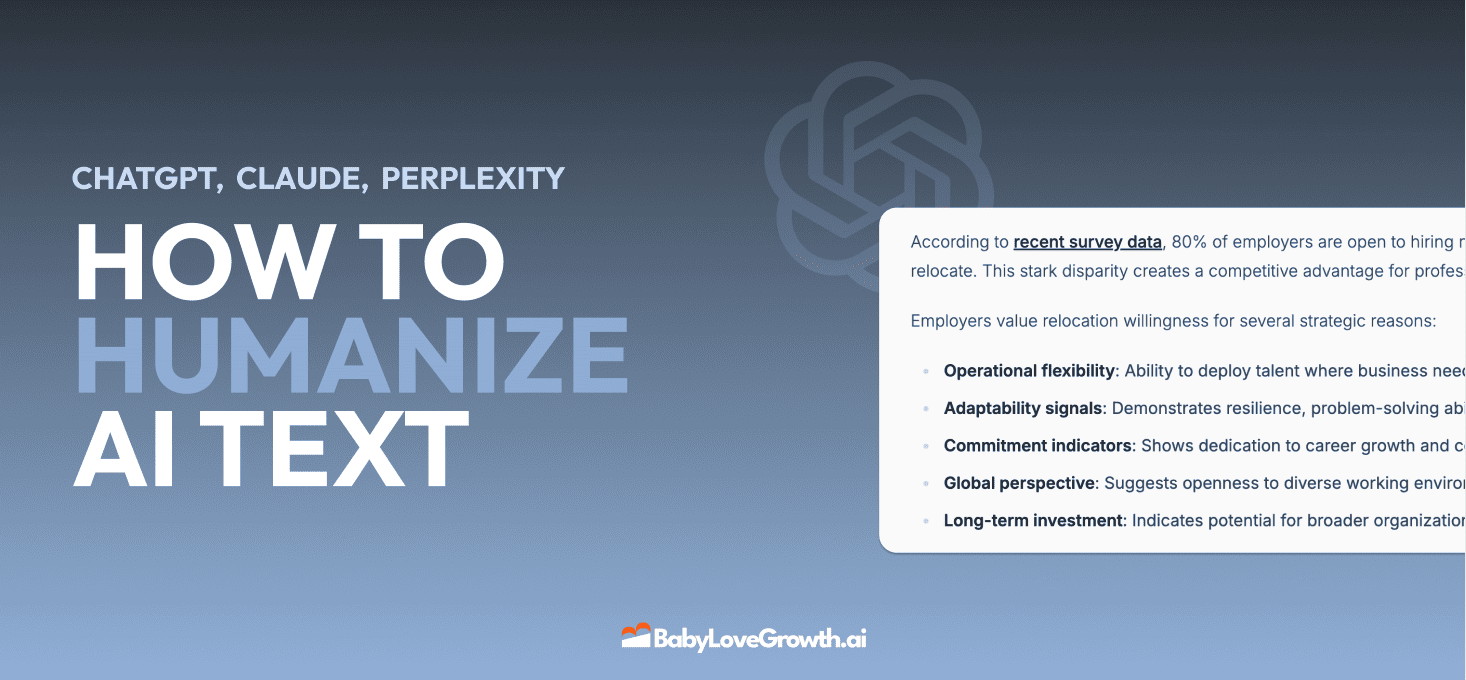
How to Humanize AI Text with Instructions
Learn practical techniques to make AI-generated content sound more natural and human. This guide covers active voice, direct addressing, concise writing, and other proven strategies to transform robotic text into engaging content.
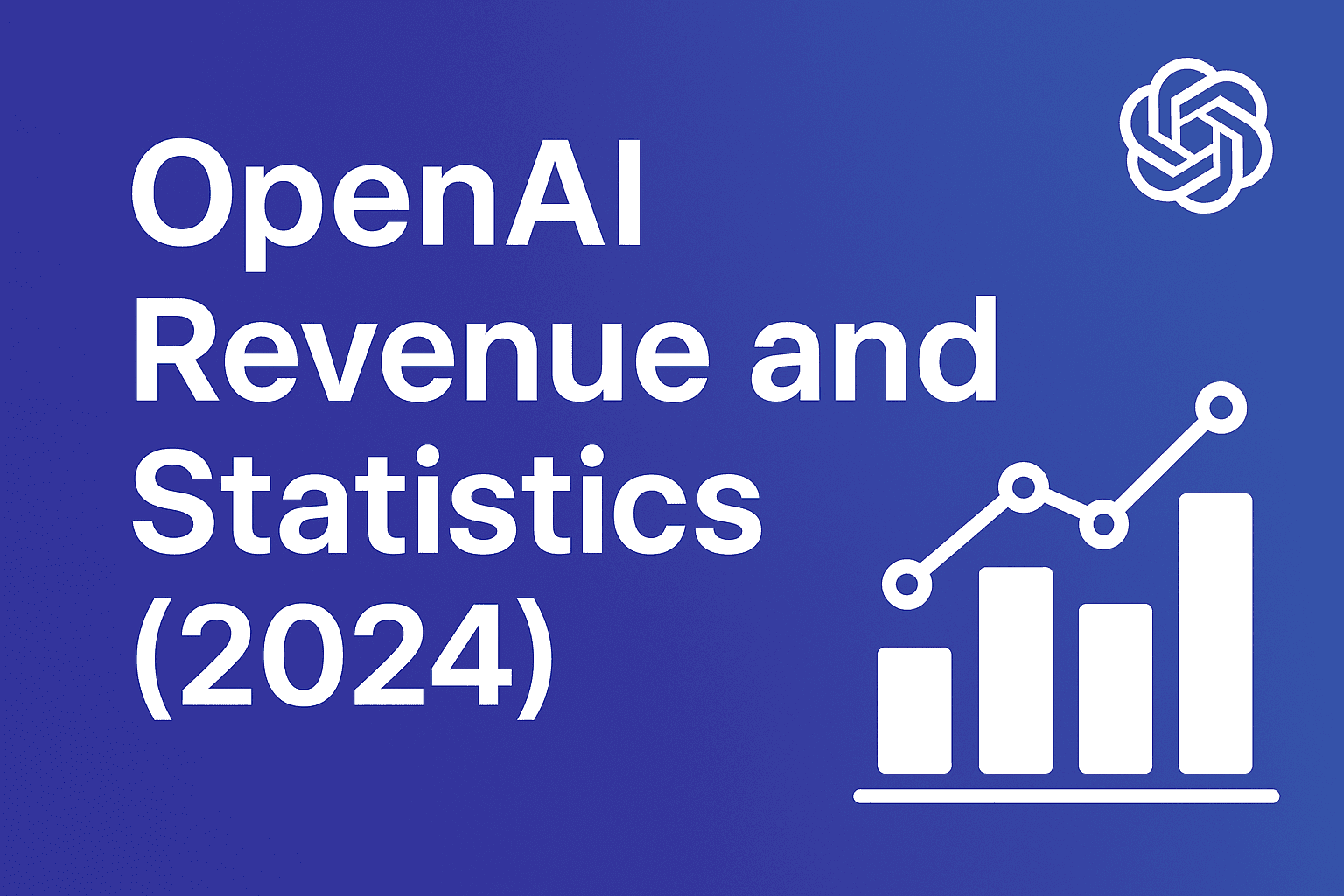
Open AI Revenue and Statistics (2024)
Comprehensive analysis of OpenAI financial performance, user engagement, and market position in 2023. Discover key statistics including $20B valuation, $1B projected revenue, and 100M+ monthly active users.